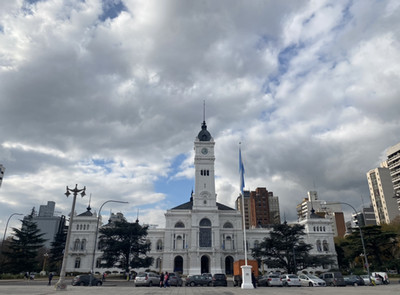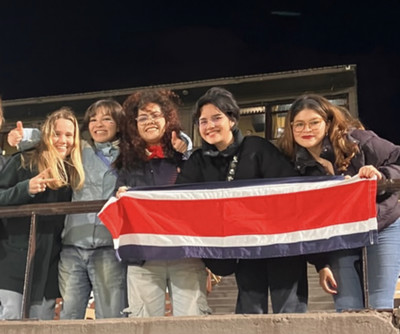A Not-So-Universal Desire to Condemn
It’s only been two weeks, but I am pretty sure (and this is genuinely not hyperbole) that I’ve consumed more meat in that time than I have in the past year. Everything is incredibly delicious, but the things I wouldn’t do for the biggest, heftiest salad dwindle with each passing day. As winter begins, vegetables are becoming less varied and more expensive, but because of the economic crisis, they’re still significantly less expensive than in the US. This week, I came home from the store with beets, and my French roommates had no idea what they were. We had a fun time making a couple different recipes, and they were somewhat of a hit! I say somewhat because we also made borscht, and that, understandably, did not strike many people’s fancy.

I witness the effects of the economic crisis everywhere I go. All the plazas are populated by people selling clothes, food, incense, and other goods in order to make enough money to live in these trying times. On my walk to work each day, I pass through the Plaza San Martín which is one of the most popular places to sell goods. Everyone is always extremely kind and friendly, despite the horrible inflation and the incredibly high poverty rate. It really puts life into perspective to experience such warm and welcoming people, even though so many face conditions that make their lives so difficult.
I’ve spent lots of time exploring more of La Plata and really keeping an eye out for the monuments and reminders of the dictatorship that are scattered throughout. At the UNLP architecture school, there is a student-designed memorial with the names of architecture students who were disappeared. At one of the high schools, they have a mural about the Noche de los Lápices and photos of all 96 students who were disappeared. I was told it took a lot of time and work to get all the photos because the military and police were extremely effective at destroying not only lives, but also evidence and memories showing the lives lived.
Because of how intertwined daily life and memories of the dictatorship are, including the countless flyers and graffiti messages littering the streets, I assumed everyone was in agreement in condemning and remembering the atrocities. While walking around La Plata, one of my CPM coworkers showed me a street name plaque that had been blacked out with spray paint. It was covered up because some people do not believe the dictatorship should be remembered as a horrific force of crime, terror, and death. The vice-president, Victoria Villarruel, is especially vocal about her dislike of the negative portrayal of the dictatorship. Despite this, the CPM and many other organizations continue to educate, research, and provide answers to the public and to private parties searching for their families and identities. From my experiences at work to my daily interactions with strangers, I am constantly reminded of the immense resilience of the Argentinian people.
This week at the CPM, I learned a lot about just how different many Argentine policies are from those in the United States. Especially in terms of gender and sexuality, the Argentine government has passed laws that remain ever so controversial in the US. For example, it is a national law that abortions be available to anyone, for any reason, through the first fourteen weeks of pregnancy. After that, an abortion may still be obtained, but under more limited circumstances. There is also the Educación Sexual Integral (ESI) which is a law establishing the right of minors to receive comprehensive sexual education in all educational institutions.

Aside from work, I watched a lot more soccer and made some new friends! On Monday, some Costa Rican friends and I headed to the friendly between the Costa Rican and Argentine women's national soccer teams. It was well-played, although we’re all still quite mad at the refs for allowing an offside goal to count. We made up almost all the fans for Costa Rica, so one of the CR television channels interviewed us. The time spent at the match and with friends was a blast despite the frigid temperature, wind, and confusion about whether we missed the last bus home from Buenos Aires to La Plata.
Next week, I begin work with the legal team, tackling current instances of torture and murder by police and prison staff. My team leader gave me a very serious talk about confidentiality and sensitivity, ending with the universal gesture of zipping his lips and throwing away the key while he stared intently, seeming to x-ray me and my intentions. I am excited about what next week brings and the opportunity I have to help advance such an important cause. With reminders of the need for human rights advocacy constantly surrounding me, my motivation to help people and change the incarceration system is ever-heightened.